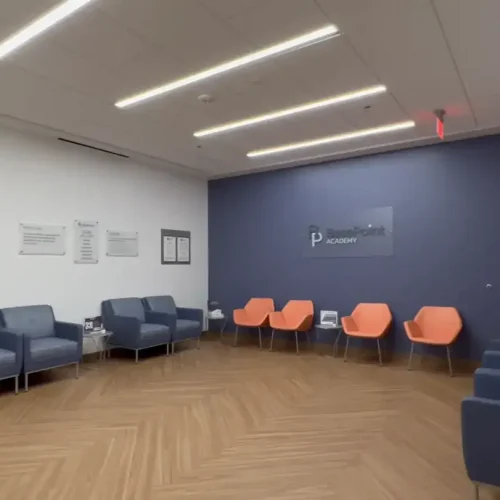Teen Bipolar Disorder Partial Hospitalization Program (PHP) in Dallas-Fort Worth, Texas
A teen bipolar disorder PHP in Dallas, Texas, provides specialized treatment for adolescents impacted by this mood disorder, estimated to affect between 1% and 5% of this demographic. With multiple locations in Dallas-Fort Worth, BasePoint Academy’s goal is to provide comprehensive day treatment to teens struggling with bipolar illness, formerly known as manic depression.
Our partial hospitalization services are available at each treatment center, allowing teens to maintain much of their daily routines and connections. On this page, learn more about the signs of bipolar disorder in teens, teen bipolar disorder PHP treatment in Dallas, Texas, and how to help a teen with bipolar disorder. At BasePoint Academy, we’re committed to facilitating access to the necessary resources, including PHP counseling and effective day treatment programs—call us to speak to a representative today.
Understanding Teenage Bipolar Disorders
Teenage bipolar disorders are affective disorders characterized by intense mood swings. These mood changes, ranging from manic highs to depressive lows, are part of the bipolar spectrum condition. Symptoms of bipolar disorder in teens include impulsivity, extreme irritability, and difficulty maintaining relationships, often making early diagnosis and treatment crucial.
Understanding bipolar spectrum conditions in teens requires recognizing their unique challenges. Manic episodes may present as bursts of energy, grandiosity, or risk-taking, while depressive phases often include withdrawal, sadness, and hopelessness. The symptoms of bipolar mood disorder can impact school performance and family dynamics. Early intervention through therapy and medication can significantly improve outcomes, empowering teens to manage their condition and thrive.
Insurance Coverage for Teen Bipolar PHP
Our complimentary assessment with a licensed clinician will provide you with a recommendation for the appropriate level of care for your teen struggling with bipolar disorder. We can also check your insurance coverage levels.
Call us today to schedule a complimentary same-day assessment at (972) 357-1749 or complete our inquiry form.
Teen Bipolar
PHP Admissions
What Are Causes of Teenage Bipolar Disorders?
The exact causes of teenage bipolar disorders are unknown. However, they likely involve genetic, biological, and environmental factors. Family history of affective disorders, brain chemistry imbalances, and high-stress environments can all contribute to the development of bipolar spectrum disorder in teens. Identifying these causes is key to understanding and managing the condition effectively.
Research indicates that genetics contribute to approximately 60% to 80% of the factors leading to bipolar condition. Brain structure and neurotransmitter imbalances also impact emotional regulation, intensifying mood swings. Environmental stressors, such as trauma, abuse, or unstable relationships, can trigger or worsen symptoms.
Does your family have a history of mental illness? Or are you noticing adolescent behavior indicative of a mood swings condition? Don’t hesitate to seek the proper support. Addressing bipolar affective disorder through early intervention and treatment is essential for improving outcomes.
What Are Different Types of Bipolar Disorders in Teens and Adolescents?
Bipolar disorders in teens, sometimes referred to as manic-depressive illnesses, are complex and can present in different forms. Each type of bipolar mental health condition involves shifts between emotional highs (mania) and lows (depression), but the intensity and pattern of these shifts vary. Here are some examples of bipolar disorders commonly seen in adolescents, though this isn’t an exhaustive list.
Cyclothymic Disorder
Cyclothymic disorder is a type of mood instability disorder characterized by chronic fluctuations between mild depressive and hypomanic symptoms. While these mood shifts are less severe than those seen in other bipolar conditions, they can disrupt daily life and relationships if left untreated. Early recognition of these patterns is essential for managing this condition effectively.
Substance-Induced Bipolar and Related Disorder
Substance-induced bipolar and related disorder occurs when mood disturbances, such as manic or depressive episodes, are triggered by alcohol, drugs, or medication. This form of bipolar syndrome highlights the complex interplay between substance use and mental health, emphasizing the importance of addressing both to achieve stability.
Bipolar I Disorder
Bipolar I is a severe bipolar psychiatric condition marked by at least one manic episode that may be accompanied by major depressive episodes. These manic episodes can cause significant disruptions in functioning, requiring professional intervention to help restore balance and stability.
Bipolar II Disorder
Bipolar II disorder involves recurring episodes of major depression and hypomania, a less extreme form of mania. While the symptoms of hypomania may appear less disruptive, the depressive episodes can profoundly impact a teen’s life, making early diagnosis and treatment critical.
Bipolar Disorder Not Otherwise Specified (NOS)
Bipolar disorder not otherwise specified falls within the bipolar spectrum illness category and is used to describe mood disorders that don’t fit neatly into defined bipolar types. Teenagers with this condition may experience significant mood swings that require personalized treatment approaches to manage.
Rapid-Cycling Bipolar Disorder
Rapid-cycling bipolar mood swing disorder is characterized by four or more distinct mood episodes—mania, hypomania, or depression—within a single year. This pattern of mood shifts can be particularly challenging for teens, making timely intervention and a tailored treatment plan essential for managing symptoms.
What Are the Signs and Symptoms of ADHD in My Adolescent Child?
Recognizing the signs of ADHD in teens can be challenging since they often mimic typical adolescent development. The symptoms of ADHD in teens are also different than those found in childhood ADHD. Teenagers can experience persistent inattention, impulsivity, and organization issues that affect their academic performance, relationships, and emotional well-being.
Hyperactivity typically declines with age, but teenagers struggle with focus and self-regulation. Teenagers may frequently lose school supplies or personal belongings or forget essential responsibilities or assignments. Restlessness can persist as fidgeting or trouble sitting still for extended periods. In adolescence, impulsivity may manifest as speaking out of turn or interrupting others.
Your teenager may procrastinate or avoid tasks that require sustained mental effort. You might notice frequent mood swings or frustration with minor challenges. If these symptoms disrupt your teen’s daily life, consult with a mental health professional for an evaluation since early diagnosis and intervention can help your teenager better manage their challenges and thrive. Some of the key signs and symptoms of ADHD in teens include:
- Difficulty focusing on tasks or following instructions
- Trouble organizing schoolwork or personal responsibilities
- Frequently losing items
- Forgetfulness
- Restlessness, including tapping or fidgeting
- Impulsive decision-making
- Interrupting conversations or speaking out of turn
- Frequent mood swings
- Frustration over minor challenges
- Procrastination
- Avoiding tasks that require sustained effort
- Poor time management

PHP - Partial Hospitalization Program: What Is It?
A Partial Hospitalization Program (PHP) offers a structured day treatment option for teenagers facing significant mental health challenges. Unlike inpatient care, these intensive day programs allow teens to return home each evening, combining the focused support of a day program with the independence of outpatient living.
PHP support services often include individual psychotherapy, group counseling, and skill-building sessions. These programs are ideal for teens transitioning from inpatient treatment or needing more support than standard outpatient care. With personalized treatment plans, PHPs help teens achieve greater stability and improve their mental well-being.
If you’re interested in enrolling your child in PHP bipolar disorder treatment in Dallas for teen girls and boys, contact us today. We can provide all the pertinent information, confirm your insurance coverage details, if applicable, and much more.
What Are the Key Differences Between Bipolar Disorder Therapy PHPs and IOPs?
The key difference between partial hospitalization and intensive outpatient programs lies in intensity and time commitment. A PHP for mental health, also known as a psychiatric day program or behavioral health day program, provides more structured, full-day treatment, while Intensive Outpatient Programs (IOP) offer part-time care, allowing for greater flexibility in daily schedules.
PHP therapy is ideal for adolescents who need comprehensive care but don’t require 24/7 inpatient support. A recovery-focused PHP commonly includes multiple therapy sessions, skill-building activities, and medical monitoring to stabilize symptoms of bipolar disorder in teens. In contrast, IOPs focus on providing targeted therapy and support a few times a week, making them a good step down from PHPs or a fit for teens with milder symptoms.
Call BasePoint Academy today to learn more about our IOP and PHP bipolar disorder treatment in Dallas for teen boys and girls. We can conduct a complimentary assessment to determine the most suitable level of outpatient day program for your child’s needs.
What Is a Partial Hospitalization Program for Teen and Adolescent Bipolar Disorder?
A Partial Hospitalization Program (PHP) for teen and adolescent bipolar disorder is structured day treatment that provides intensive care without requiring overnight stays. Teens with mania-depression disorder benefit from focused therapy sessions, skill-building activities, and medical support, all tailored to help them manage mood swings and improve emotional stability.
Many mental health PHPs often function as dual diagnosis day programs, addressing both bipolar symptoms and common co-occurring disorders like anxiety or substance use. Studies have indicated that individuals with bipolar disorder frequently experience co-occurring substance use disorders. Integrated and simultaneous treatment within a dual diagnosis PHP is essential to favorable outcomes.
A partial hospitalization program combines individual therapy, group counseling, and family involvement to empower teens to develop coping strategies, enhance their well-being, and transition smoothly into their daily lives.
What Is a Bipolar Disorder Therapy PHP for Teens in Dallas, Texas?
A bipolar disorder therapy PHP for teens in Dallas, Texas, is an intensive mental health program that provides professional support to adolescents managing this mood disorder. The structured day treatment includes psychotherapy sessions, skill-building activities, and medical monitoring, all aimed at helping teens stabilize their moods and navigate daily challenges effectively.
These programs address the unique needs of teens living with bipolar disorder. Through a combination of individual therapy, group counseling, and family support, your child will learn coping mechanisms and strategies to manage the mood swings characteristic of bipolar emotional disorder and improve their overall well-being. The comprehensive approach and integration of various therapy modalities found in a teen bipolar disorder PHP in Dallas, Texas, empowers teens to thrive in school, relationships, and beyond.
Therapy and Counseling Options for Teenage Bipolar Disorder at PHPs in Dallas, Texas

Recognizing the signs of bipolar disorder in teens is the first step toward effective treatment. Teen bipolar disorder PHP treatment in Dallas, Texas, offers a range of valuable therapy and counseling options to manage the unique challenges teens face. Below are some examples of therapeutic approaches used in partial hospitalization programs, though this list isn’t exhaustive.
Psychodynamic Therapy Techniques
Psychodynamic therapy techniques help teens explore unconscious emotions and past experiences that may contribute to bipolar symptoms. By understanding these underlying issues, adolescents can gain insight into their behaviors and thought patterns, fostering greater self-awareness and emotional resilience in managing bipolar illness.
Family Therapy for Teenage Bipolar Disorders
Family therapy is crucial for treating teenage bipolar disorders, as it addresses the family dynamics and communication patterns that can impact a teen’s mental health. This therapy helps families learn effective ways to support their teen, improving understanding and creating a more nurturing home environment.
Dialectical Behavior Therapy (DBT)
Dialectical Behavior Therapy (DBT) is particularly effective for teens with mood disorders, focusing on emotional regulation, distress tolerance, and interpersonal skills. DBT equips teens with practical tools to manage intense emotions and improve relationships, reducing self-destructive behaviors and promoting stability.
Cognitive Behavioral Therapy (CBT)
Cognitive Behavioral Therapy (CBT) is a widely used approach for treating teenage bipolar spectrum disorder, emphasizing the connection between thoughts, feelings, and behaviors. Teens learn to challenge negative thought patterns, develop healthier coping strategies, and build skills to manage mood swings and stress effectively.
Experiential Therapy for Teen Bipolar Disorders
Experiential therapy involves engaging teenagers in activities like art, music, or outdoor experiences to help them process emotions and express themselves non-verbally. This therapeutic approach can be constructive for teens with bipolar conditions as it encourages creative expression and emotional growth.
Group Therapy for Adolescent Bipolar Disorders
Group therapy provides a supportive space where teens living with bipolar psychiatric conditions can share experiences, build social skills, and learn from one another. This peer-based approach fosters community, reduces feelings of isolation, and promotes mutual support and encouragement in managing mental health challenges.
Individual and Person-Centered Therapy for Teenage Bipolar Disorders
Individual, person-centered therapy focuses on the unique needs of each teen, allowing for a personalized treatment approach. This method emphasizes building a strong therapeutic relationship, encouraging self-discovery, and helping teens set and achieve personal goals in managing bipolar disorder.
BasePoint Academy Accepts health Insurance
We accept most major health insurance providers in Texas and can check your treatment coverage levels on your behalf.
Teen and Adolescent Bipolar Disorder Partial Hospitalization Programs in Dallas, Texas
BasePoint Academy’s specialized teen bipolar disorder PHP in Dallas, Texas, has repeatedly proven to meet the unique needs of our communities. Our day treatment programs are personalized and effective in helping teens build resilience, manage their symptoms, and recover in an empathetic and encouraging setting.
Whether your child is struggling with affective disorders, depression, anxiety, substance misuse, or other mental health challenges, Our focused, high-quality care offers complete support to promote healing. Allow our experienced team to guide your teen toward recovery with a tailored treatment plan and compassionate support.
- Arlington, Texas: 3900 Arlington Highlands Blvd, Suite 237, Arlington, TX 76018
- Forney, Texas: 713 W Broad St, Suite 200, Forney, TX 75126
- Frisco, Texas: 8275 Judges Way, Suite 100I, Frisco, TX 75036
- McKinney, Texas: 4733 Medical Center Drive, McKinney, TX 75069

How to Find a Bipolar Disorder PHP for Teens in Dallas, Texas
We understand how crucial it is to find the right treatment center and intensive day program for adolescent bipolar disorder. This decision can significantly impact your teen’s well-being and future, so choosing wisely is essential. Below is a helpful guide to finding a teen bipolar disorder PHP in Dallas, Texas, and surrounding areas:
- Start by searching online for terms like “teen bipolar disorder partial hospitalization program near me” or “teen bipolar treatment programs in [location].” Narrowing your search by adding specific neighborhoods such as Arlington, Forney, McKinney, Downtown Dallas, Uptown, or Lake Highlands will yield more localized results.
- Prioritize centers offering evidence-based and individualized care. Treatment that is tailored to each teen’s unique needs and combines multiple therapeutic approaches has proven most effective for managing bipolar mood disorder.
- Ensure the center is accredited. Accredited centers meet high standards of care and ethics, ensuring that your teen will receive safe, reliable treatment from qualified professionals. BasePoint Academy boasts accreditation from The Joint Commission and others.
- Consider the location. Opting for a center close to home allows for more effortless family involvement, providing essential support during your teen’s treatment journey.
- Check reviews and testimonials. Feedback from other families who’ve gone through the program can offer invaluable insights into the quality of care, the staff’s expertise, and the overall experience.
- Reach out to the center directly. Contacting the program to inquire about their partial hospitalization services, support options, and insurance/payment details will help you make a well-informed decision. Many centers, including BasePoint Academy, also offer free consultations to assist you in decision-making.
What Is the BasePoint Difference?

7am to 7pm CST
7 Days a Week

Full Time Physican
On Site

We Transport
To and From

Therapy Involving
the Whole Family

Family
Owned

Does Health Insurance Cover PHPs for Adolescent Bipolar Disorder Therapy Around Dallas?
Health insurance often covers Partial Hospitalization Programs (PHPs) for adolescent bipolar disorder therapy around Dallas. The extent of coverage will depend on your particular plan and multiple other factors. Many insurance providers recognize the importance of intensive, structured care for mental health conditions, including bipolar disorder.
It’s important to check your insurance details to understand what is included. Contact us for a thorough review of your benefits and to inquire about coverage for our teen bipolar disorder PHP in Dallas, Texas. We can provide specifics on copays, deductibles, any necessary prior authorizations, and more. Understanding your insurance plan will help you make informed decisions and secure the appropriate care for your teen’s mental health needs.

Which Health Insurance Providers Have Plans to Cover Bipolar Disorder Therapy PHPs for Adolescents?
A variety of top health insurance companies offer coverage for bipolar disorder PHP therapy for teens. Providers such as Aetna, Cigna, UnitedHealthcare, Blue Cross Blue Shield of Texas (BCBSTX), and Optum may include this option. However, we always recommend confirming the specifics of your policy.
To ensure your teen’s treatment is covered, consult a healthcare provider like BasePoint Academy. We can assist in navigating your insurance benefits and clarifying what mental health services, including teen bipolar disorder PHP treatment in Dallas, Texas, are part of your coverage.
Are There Free and Confidential Bipolar Disorder Evaluations and Assessments Near Me?
If you’re seeking free, confidential evaluations for teens struggling with bipolar disorder, there are resources to help. Many treatment centers, including BasePoint Academy, offer no-cost assessments to determine the right level of care for your teen. These evaluations are conducted by licensed professionals specializing in adolescent psychology, ensuring your teen’s unique needs are thoroughly understood and addressed.
If you’re ready to proceed with an evaluation, call us today at (972) 357-1749. Our confidential assessments can help you explore the best treatment options for your teen’s bipolar disorder. Our caring team is here to support you through this crucial first step in your child’s transformative path to stability and healing.
What Is the Admissions Process for Teen and Adolescent Bipolar Disorder Treatment PHPs?
The admissions process for teen and adolescent bipolar disorder treatment Partial Hospitalization Programs (PHPs) ensures that your child receives personalized care tailored to their specific needs. While each treatment center may have its procedures, here’s an overview of what you can expect during the process:
- Initial Contact: The process begins when you contact the treatment center, whether by phone, email, or online. The admissions team will gather basic information about your teen’s bipolar symptoms and discuss their treatment needs.
- Assessment and Evaluation: A licensed professional will assess your teen’s medical history, current symptoms, and emotional well-being. This evaluation helps determine the appropriate level of care and informs the development of a treatment plan.
- Insurance Verification: The admissions team will verify your insurance coverage and explain any out-of-pocket costs. They will work with your insurer to confirm benefits and help with financial arrangements if needed.
- Treatment Plan: A personalized treatment plan is developed based on the assessment, often incorporating therapies like Cognitive Behavioral Therapy (CBT), psychoeducation, and family therapy to address symptoms of bipolar disorder in teens and improve emotional regulation.
- Admissions Coordination: The admissions coordinator will guide you through the next steps, including what your child should bring and detailed program information. They’ll also confirm the start date and address any questions you may have.
- Orientation and Program Introduction: On the first day, your teen will receive an orientation to familiarize them with the facility, staff, and daily schedule and ease any concerns.
- Active Participation in Treatment: Your teen will participate in individual and group therapy sessions, skill-building activities, and other therapeutic interventions that manage bipolar symptoms and stabilize mood swings.
- Progress Monitoring and Adjustments: The treatment team will continuously monitor your teen’s progress and adjust the plan as needed. Regular communication ensures everyone remains aligned in supporting the recovery process.
How Much Does an Adolescent Bipolar Disorder Treatment Partial Hospitalization Program Cost with Health Insurance Assistance?
The cost of an adolescent bipolar disorder treatment Partial Hospitalization Program (PHP) can vary based on factors like your insurance coverage, location, and the specific program. They can range from $500 to $1,200 plus daily. Many families find that most of these costs are covered with health insurance assistance, leaving them responsible for out-of-pocket expenses like copays and deductibles.
To better understand the exact cost, it’s important to contact a treatment center or your insurance provider to confirm your mental health benefits. Insurance plans typically cover a significant portion of structured day treatment programs, but the amount can significantly vary. When speaking with healthcare providers like BasePoint Academy, you can also inquire about available financial assistance options to reduce out-of-pocket expenses.

How Much Does an Adolescent Bipolar Disorder Treatment Partial Hospitalization Program Cost Without Insurance Coverage?
The cost of an adolescent bipolar disorder treatment Partial Hospitalization Program (PHP) without insurance coverage can vary significantly. They often range between $500 and $1,200 per day, depending on elements like the treatment center, location, and level of care. These programs typically last several weeks so that the total cost can add up quickly.
If you do not have insurance or don’t fully cover PHP therapy, many centers offer payment plans or financial assistance to make the cost more manageable. It’s a good idea to contact the treatment center directly to explore any available options and discuss a payment structure that works for your family’s situation.
Reasons to Enroll My Teen Child in a Bipolar Disorder Treatment PHP
Enrolling your teen in a bipolar disorder treatment Partial Hospitalization Program (PHP) offers the intensive support needed to manage symptoms and build coping skills. PHPs provide structured care, combining therapy, skill-building activities, and medical monitoring, helping your teen stabilize their mood and develop the tools necessary for long-term emotional well-being.
This program offers a safe environment where your teen can receive focused care while maintaining independence. By addressing mood disorders’ emotional and psychological aspects, a PHP can significantly improve your teen’s quality of life, fostering healthier relationships, better academic performance, and a brighter future.
Contact The BasePoint Academy Today!
Does your teen have bipolar disorder signs or symptoms? Contact BasePoint Academy to discuss a treatment plan for your teen.
Sources
- World Health Organization. (n.d.). Mental health of adolescents. World Health Organization. Retrieved from https://www.who.int/news-room/fact-sheets/detail/adolescent-mental-health on July 11, 2023
- Horowitz, J. M. (2019, February 20). Most U.S. teens see anxiety and depression as a major problem among their peers. Pew Research Center’s Social & Demographic Trends Project. Retrieved from https://www.pewresearch.org/social-trends/2019/02/20/most-u-s-teens-see-anxiety-and-depression-as-a-major-problem-among-their-peers/ on July 11, 2023
Statistics and Info on Teenage Bipolar Disorder and Partial Hospitalization Programs for Texas Families
- A study on one-year treatment utilization among adolescents with bipolar spectrum disorder found that 17% of these teens utilize Partial Hospitalization Programs (PHP).
- The Semel Institute for Neuroscience and Human Behavior at UCLA says genetics contribute to approximately 60% to 80% of the factors leading to bipolar disorder.
- In the journal Psychiatry Services, authors stated that adolescents with pediatric bipolar disorder incur significantly higher behavioral and general medical healthcare costs compared to those with other psychiatric disorders. This is primarily due to increased hospital admissions and medical visits related to injuries and overdoses, highlighting the importance of early intervention.
- The Systematic Treatment Enhancement Program for Bipolar Disorder (STEP-BD) found that combining medication with up to 30 sessions of therapies such as cognitive-behavioral therapy, interpersonal and social rhythm therapy, or family-focused therapy was more effective than using medication alone with minimal psychoeducation.
- The American Psychological Association states that, on average, individuals with bipolar disorder wait approximately 10 years from the time they first seek mental health services to receive an official diagnosis.
- Biological Psychiatry reports that 27.7% of individuals experience the first onset of bipolar disorder symptoms before the age of 13, while 37.6% show initial symptoms between the ages of 13 and 18.
- Teens are naturally inclined toward risky behavior, but this risk increases significantly when they have bipolar disorder. Be vigilant for signs of substance abuse, such as alcohol or drug use, as well as suicidal tendencies. The risk of suicide in individuals with bipolar disorder is among the highest of all psychiatric conditions.







